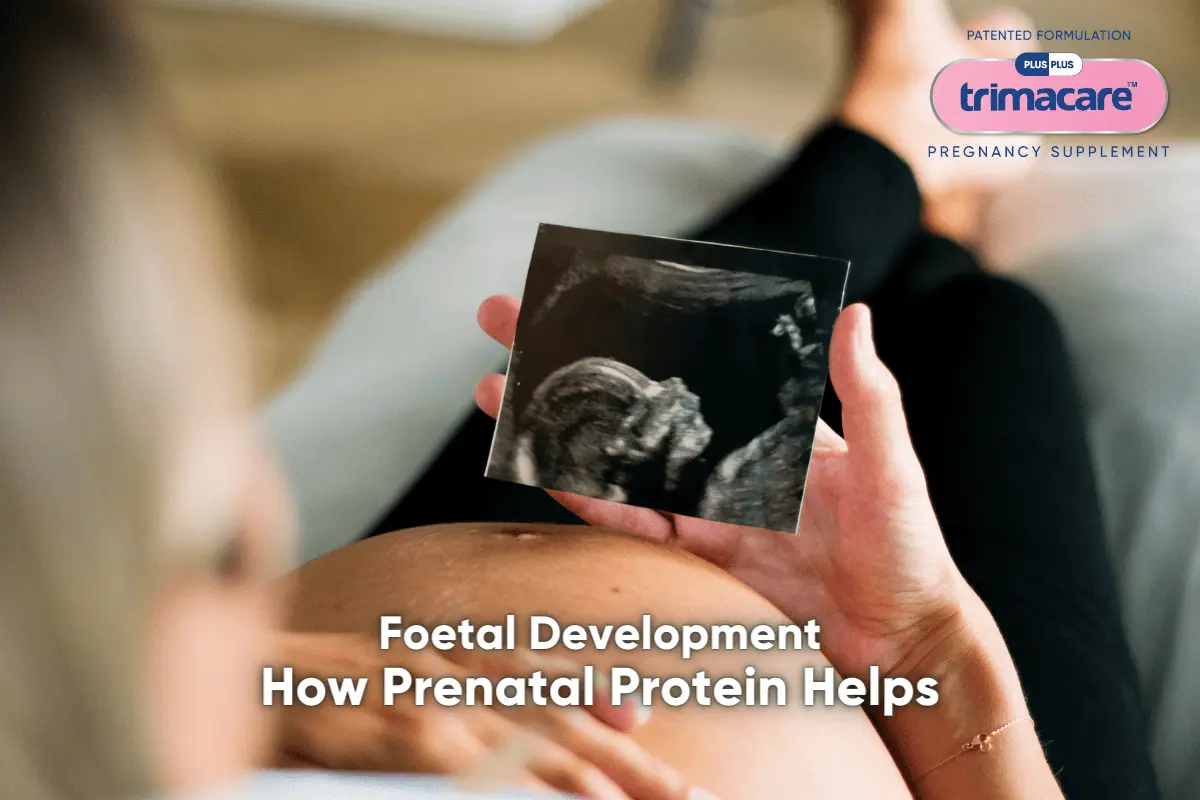Protein in pregnancy is necessary for the development of the foetus and plays a vital role in the cellular structure, DNA replication, cell division, and synthesis. They form cell membranes, cytoskeletons, and organelles, regulate biochemical reactions, and participate in signalling pathways.
Protein for pregnant women also plays a role in the development of the immune system, nutrient transport, and hormonal regulation, which ensure proper growth and maturation of the foetus.
Mid-pregnancy is the most critical period for a baby since the brain and body parts grow very fast, and even the bone structure begins to form. Mothers should ensure that trace elements are part of their daily diet because the general development and well-being of the baby depend on such components, which are essential in higher nutrient intake during this period.
The process of foetal development is highly complex and tightly regulated, and protein during pregnancy serves as a key building block and regulator at various stages.
High protein food during pregnancy is beneficial in foetal development, such as the increase in the growth of various tissues and organs in a developing foetal.
ROLE OF PROTEINS IN FOETAL DEVELOPMENT:
Proteins are essential for foetal development since they help in cell division, differentiation, and tissue formation. Enzymes are proteins with specialized functions regulating biochemical reactions, DNA synthesis, and cellular growth. They contribute to the development of the nervous system, the immune function, and the structural integrity of the foetus, which leads to healthy growth and maturation of organs.
Proteins play a multifaceted role in the intricate process of foetal development.
Protein during pregnancy is essential for the intricate process of foetal development, playing a multitude of pivotal roles:
- Cellular Growth and Differentiation: Proteins for pregnant women are essential building blocks of cells, facilitating cell division, differentiation, and forming specialized tissues and organs. During foetal development, cells multiply and differentiate to form specialized tissues and organs. Growth factors and signalling proteins in pregnancy regulate cell division, and transcription factors control the differentiation of cells into specific cell types. Proteins in pregnancy help form the cytoskeleton and are crucial in biochemical reactions such as DNA replication and cell division for the overall development of the foetus.
- Enzymatic Activity: Enzymes are proteins specialized for pregnant women. There is a paramount role in DNA replication, metabolism, and cellular function, which is always important for foetal growth. Protein of DNA replication and transcription for pregnant women helps in ensuring inheritance can occur. DNA polymerase and RNA polymerase are necessary for the synthesis of a DNA strand and RNA.
- Hormonal Regulation: Most of the hormones needed for foetal development are protein-based, regulating growth, metabolism, and maturation of organs.
- Structural Development: The structural proteins during pregnancy are collagen, actin, and tubulin, which provide structural support to cells, tissues, and other organs as they form their shape. The proteins for pregnant women contribute to the general framework of their body, which may affect their cell shape type, level of elasticity of tissues, and structural strength altogether.
- Immune System Support: Maternal antibodies and proteins confer temporary immunity to the foetus during early life stages, help in the development of the foetal immune system, and protect from some infections.
- Nutrient Transport: The transfer of nutrients from the mother to the developing foetus involves proteins. To feed the developing foetus, proteins transfer essential nutrients across the placenta, therefore supporting the growth and development of the developing foetus.
- Neurological Development: These proteins are important to the foetal nervous system and are the very ones forming the neural networks thereby developing the brain structure.
- DNA Replication and Transcription: Proteins in pregnancy are important in DNA replication and transcription. Other enzymes, such as DNA polymerase and RNA polymerase, are important for synthesizing new DNA strands and RNA transcripts.
HOW MUCH PROTEIN IS NEEDED FOR FOETAL DEVELOPMENT DURING PREGNANCY?
Experts recommend that the intake of proteins should be between 75 and 100 grammes per day. Protein helps to promote the growth of foetal tissues, especially the brain. It also promotes the growth of your uterine and breast tissue throughout your pregnancy and increases the flow of blood throughout your body.
TRIMACARE – THE BEST PROTEIN SUPPLEMENT FOR PREGNANCY
Protein is essential to the growth and development of any baby, starting from organs to tissues, then muscles, and at last cells. Trimacare multivitamin for pregnant women provides essential nutrients for long-term and short-term physical and mental development, promotes well-being in motherhood, ensure early recovery from pregnancy and prevents future health concerns such as osteoporosis, hypertension, and diabetes.
Trimacare pregnancy vitamin tablet is based on the ICMR and WHO Multi-Micronutrient Model and was created under the supervision of well-known doctors, nutritionists, and pharmacologists. Trimacare pregnancy multivitamin contains 20+ nutrients necessary for pregnancy. Trimacare prenatal multivitamin provides trimester-specific care for the needs of Indian mothers and their unborn children at every stage of pregnancy.
Protein-rich Trimacare prenatal tablets are crucial for foetal development, supporting cellular growth, tissue formation, and organ development. Protein in Trimacare multivitamin tablet for pregnant women provide adequate amino acids to the mother, ensuring she receives the necessary amino acids for the baby’s optimal growth and health. Proteins are essential building blocks in foetal development.
Proteins in prenatal vitamins support the development of vital structures like muscles, organs, and the foetus’s central nervous system. Protein in Trimacare prenatal multivitamins for women provide a balanced mix of essential amino acids, sustaining rapid cellular division and differentiation.
Frequently Asked Questions:
- What is the role of protein in foetal development?
Since protein is necessary for the growth and development of the tissues, organs, and body structure of the unborn baby, it plays a significant role in foetal development.
- How many grams of protein shall be consumed in a day for optimal fetal development by a pregnant woman?
The amount of protein that a pregnant woman is supposed to consume daily varies, but an average of about 25 grams more than usual will be recommended for pregnant women in order to cater for the needs of both the mother and the baby developing inside.
- Is protein malnutrition during pregnancy potentially harmful to foetal development?
Yes, too little protein consumed during pregnancy adversely affects the foetus in that it grows less, has lower birth weight, and is also at risk of future health problems with the child.
- Is there certain proteins that are specifically beneficial to foetal development?
Proteins that come from lean meats, poultry, fish, dairy, legumes, nuts, and seeds supply the baby with the needed essential amino acids in the diet to help its growth and development. There should be varied intake of foods that are protein-rich to meet the needs of both the mother and the foetus.
- What is the contribution of protein intake during pregnancy to the health of the mother?
A pregnancy diet with enough protein helps in the proper development of the foetus and also keeps the mother healthy, boosting her immune system in addition to helping in the production of hormones and enzymes needed during that time and repairing and growing her tissues.
A Certified Nutritionist with a rich healthcare background in health journalism, the author has immense experience in curating reader-friendly, engaging, and informative healthcare blogs to empower readers to make informed pregnancy-related decisions.












